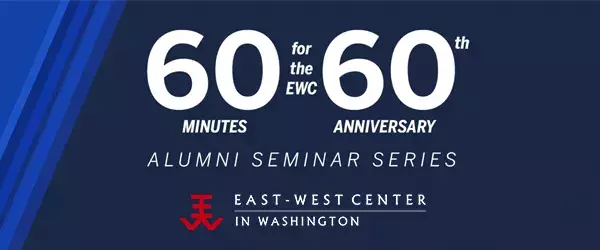Error message

OFFICE/DEPARTMENT
The East-West Center in Washington invites you to the
60 Minutes for the EWC 60th Anniversary Virtual Seminar Series:
East Asia's Great Powers and the Future Regional Order:
Four Scenarios
Featuring:
Professor Evelyn Goh
(EWCW Southeast Asia Visiting Fellow, 2004),
Shedden Professor of Strategic Policy Studies &
Director of Research, Strategic and Defence Studies Centre,
The Australian National University
Dr. Satu P. Limaye (Moderator)
Vice President, East-West Center &
Director, East West Center in Washington
The deepening gulf between the United States and China, accompanied by dire warnings that we are headed for a new cold war, refocuses attention on East Asia

and its potential flashpoints. The current leadership transition in Japan also serves as a reminder of the importance of Japan, not only as a US ally, but as a pivotal player in regional security. In a newly-published major book, Goh argues that fresh strategic ideas about East Asia must begin with the recognition that order in this region ultimately depends upon China and Japan. These two regional great powers must find ways to manage their differences and to coexist peacefully for regional stability to ensue in the medium- to long-term. But numerous obstacles stand in the way of Sino-Japanese reconciliation and cooperation, including power politics, territorial disputes, and bitter recriminations over war memories. Furthermore, the challenge is not simply a bilateral one: Japan and China also have to deal with -- and often through -- third parties, primarily the United States. Yet, for regional security and stability to prevail, Japan and China will need to negotiate a new great power bargain between themselves and with other key states in East Asia. This seminar examined four scenarios, all of which require Beijing and Tokyo to negotiate a new great power bargain directly with each other for the first time in living memory, with varying implications for the US role in East Asia. This seminar drew from Dr. Goh's latest book (co-authored with Barry Buzan), Re-thinking Sino-Japanese Alienation (Oxford, 2020).
This year marks the 60th anniversary of the East-West Center and its mission to promote better relations and understanding among the people and nations of the United States, Asia, and the Pacific through cooperative study, research, and dialogue. The East-West Center in Washington (EWCW)’s 60 Minutes for the EWC 60th Anniversary Alumni Seminar Series highlights the work of EWCW alumni/ae who have participated in our fellowship, publication, dialogue, and conference programs.
SPEAKER BIOGRAPHIES
Evelyn Goh (MA, MPhil, DPhil) is the Shedden Professor of Strategic Policy Studies at The Australian National University, where she is also the Director of Research at the Strategic and Defence Studies Centre. Her expertise is Asian security and international relations, in theory and practice. Professor Goh's key publications include The Struggle for Order: Hegemony, Hierarchy and Transition in Post-Cold War East Asia (Oxford, 2013); ‘Great Powers and Hierarchical Order in Southeast Asia’, International Security (Winter 2007/8); Constructing the US-China Rapprochement, 1961-1974 (Cambridge, 2005); and Rising China’s Influence in Developing Asia (Oxford, 2016, Editor). This seminar draws from her latest book (co-authored with Barry Buzan), Re-thinking Sino-Japanese Alienation (Oxford, 2020). Evelyn has held previous faculty positions at the University of Oxford, Royal Holloway University of London, and the Rajaratnam School of International Studies in Singapore.
Satu Limaye is Vice President of the East-West Center and the Director of the East-West Center in Washington where he created and now directs the Asia Matters for America initiative and is the founding editor of the Asia Pacific Bulletin. He is also a Senior Advisor at CNA Corp (Center for Naval Analyses) and Senior Fellow on Asia History and Policy at the Foreign Policy Institute at Paul H. Nitze School of International Studies (SAIS). He is a graduate of Georgetown University and received his doctorate from Oxford University (Magdalen College) where he was a George C. Marshall Scholar. Recent publications include: “America’s ‘Pacific Principle’ in an Indivisible Pacific Islands Region,” (Asia-Pacific Bulletin); “Despite Stumbles, America’s Engagement with Southeast Runs Deep,” (Global Asia); Raging Waters: China, India, Bangladesh, and Brahmaputra Water Politics (Marine Corps University Press); and Russia’s Peripheral Relevance to US-Indo Pacific Relations (Center for the National Interest).
The East-West Center in Washington invites you to the
60 Minutes for the EWC 60th Anniversary Virtual Seminar Series:
East Asia's Great Powers and the Future Regional Order:
Four Scenarios
Featuring:
Professor Evelyn Goh
(EWCW Southeast Asia Visiting Fellow, 2004),
Shedden Professor of Strategic Policy Studies &
Director of Research, Strategic and Defence Studies Centre,
The Australian National University
Dr. Satu P. Limaye (Moderator)
Vice President, East-West Center &
Director, East West Center in Washington
The deepening gulf between the United States and China, accompanied by dire warnings that we are headed for a new cold war, refocuses attention on East Asia

and its potential flashpoints. The current leadership transition in Japan also serves as a reminder of the importance of Japan, not only as a US ally, but as a pivotal player in regional security. In a newly-published major book, Goh argues that fresh strategic ideas about East Asia must begin with the recognition that order in this region ultimately depends upon China and Japan. These two regional great powers must find ways to manage their differences and to coexist peacefully for regional stability to ensue in the medium- to long-term. But numerous obstacles stand in the way of Sino-Japanese reconciliation and cooperation, including power politics, territorial disputes, and bitter recriminations over war memories. Furthermore, the challenge is not simply a bilateral one: Japan and China also have to deal with -- and often through -- third parties, primarily the United States. Yet, for regional security and stability to prevail, Japan and China will need to negotiate a new great power bargain between themselves and with other key states in East Asia. This seminar examined four scenarios, all of which require Beijing and Tokyo to negotiate a new great power bargain directly with each other for the first time in living memory, with varying implications for the US role in East Asia. This seminar drew from Dr. Goh's latest book (co-authored with Barry Buzan), Re-thinking Sino-Japanese Alienation (Oxford, 2020).
This year marks the 60th anniversary of the East-West Center and its mission to promote better relations and understanding among the people and nations of the United States, Asia, and the Pacific through cooperative study, research, and dialogue. The East-West Center in Washington (EWCW)’s 60 Minutes for the EWC 60th Anniversary Alumni Seminar Series highlights the work of EWCW alumni/ae who have participated in our fellowship, publication, dialogue, and conference programs.
SPEAKER BIOGRAPHIES
Evelyn Goh (MA, MPhil, DPhil) is the Shedden Professor of Strategic Policy Studies at The Australian National University, where she is also the Director of Research at the Strategic and Defence Studies Centre. Her expertise is Asian security and international relations, in theory and practice. Professor Goh's key publications include The Struggle for Order: Hegemony, Hierarchy and Transition in Post-Cold War East Asia (Oxford, 2013); ‘Great Powers and Hierarchical Order in Southeast Asia’, International Security (Winter 2007/8); Constructing the US-China Rapprochement, 1961-1974 (Cambridge, 2005); and Rising China’s Influence in Developing Asia (Oxford, 2016, Editor). This seminar draws from her latest book (co-authored with Barry Buzan), Re-thinking Sino-Japanese Alienation (Oxford, 2020). Evelyn has held previous faculty positions at the University of Oxford, Royal Holloway University of London, and the Rajaratnam School of International Studies in Singapore.
Satu Limaye is Vice President of the East-West Center and the Director of the East-West Center in Washington where he created and now directs the Asia Matters for America initiative and is the founding editor of the Asia Pacific Bulletin. He is also a Senior Advisor at CNA Corp (Center for Naval Analyses) and Senior Fellow on Asia History and Policy at the Foreign Policy Institute at Paul H. Nitze School of International Studies (SAIS). He is a graduate of Georgetown University and received his doctorate from Oxford University (Magdalen College) where he was a George C. Marshall Scholar. Recent publications include: “America’s ‘Pacific Principle’ in an Indivisible Pacific Islands Region,” (Asia-Pacific Bulletin); “Despite Stumbles, America’s Engagement with Southeast Runs Deep,” (Global Asia); Raging Waters: China, India, Bangladesh, and Brahmaputra Water Politics (Marine Corps University Press); and Russia’s Peripheral Relevance to US-Indo Pacific Relations (Center for the National Interest).








